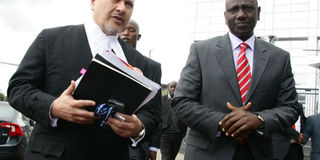Ruto denied chance to address court

Lawyer Karim Khan and his client, Kenya's Deputy President William Ruto. Judges Friday turned down a request by the defence that Mr Ruto and Mr Sang address the chamber.
The trial of Deputy President William Ruto and co-accused Joshua arap Sang at the ICC continued Friday, with the court reverting to private session.
In the closed hearing, the public can see inside the courtroom but can neither hear what is said nor see the protected Witness 536.
At the opening of the proceedings, judges turned down a request by the defence that Mr Ruto and Mr Sang address the chamber. Presiding judge Chile Eboe-Osuji said: “Parties are represented by counsel. The chamber will not, this time, allow Ruto address the court from time to time.”
The enhanced protective measures for the witness were adopted by the court after it emerged that there were attempts to intimidate her and her family.
“A private session is not a secret session. That needs to be explained. The public can see what is going on inside the courtroom but cannot hear what is being said,” Judge Eboe-Osuji said.
The chamber also directed the prosecution to ensure the public redacted version of the witness testimony is published by this morning.
Mr Katwa Kigen, the lead defence lawyer for Mr Sang, asked the judges to “maintain some amount of supervision on the amount of redaction so as not to cause prejudice to the accused.”
Mr Ruto’s lead defence counsel Karim Khan also requested the chamber to provide the public with a synopsis of the day’s proceedings at the end of each day when the court is in private or closed session— a request the chamber said they would consider.
Witness 536 was led through her evidence by the prosecution, with indications that the defence and victims’ lawyer would cross-examine her next week.





